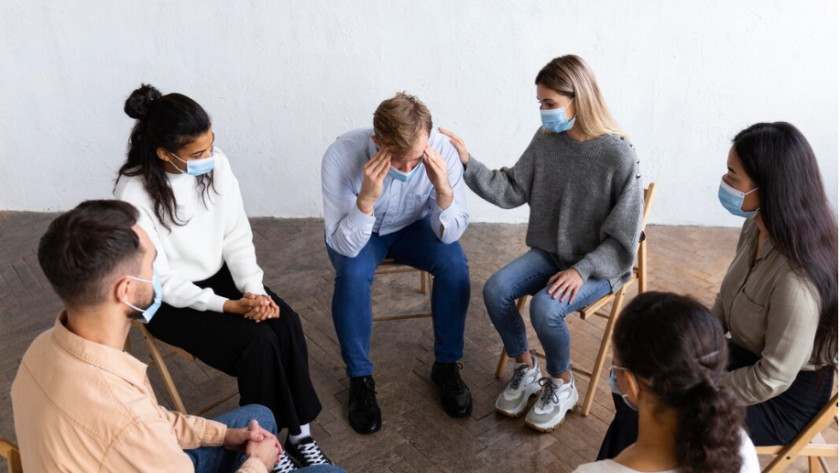Breaking the Stigma: Why Mental Health Awareness is Important
Our mental health is something that is a huge aspect of our general health, and there are still some people who don’t seem to understand or see its importance. It is a fact that, even if society has progressed in terms of accepting mental health as being part of the aspects of health care, there is an ever-present stigma that discourages the open discussion and necessary treatment of such mental disorders.
Signs & Solutions of Mental Health Struggles
In the past few years, mental health issues have been more “in the know” thanks to advocates, but there is still a long way to go in altering the stigma of mental health and establishing a more helpful environment. This article examines some of the reasons why mental health awareness is important the effects of stigma, and what we can all do to make this world a better place.
The Importance of Mental Health and Mental Health Awareness

Mental health deals with our emotional inner world, our behaviors, and how those behaviors are expressed in relationships and integration with the social world. It determines how we think, feel, and conduct ourselves and is central to every person’s entire life, from childhood through adulthood.
Recommendations from WHO indicate that globally about 970 million people, one in eight live with certain mental disorders. But the number may be closer to two or three, as the existence of stigma often leads patients to conceal their struggles.
The importance of mental health awareness means not only understanding the various aspects of well-being, and being able to identify the signs of a mental health problem, but also knowing that it is okay to ask for help. By advocating for mental health awareness, we are normalizing the concept and giving hope for those who are suffering whereby they know that one day they will receive help- it creates a healthier society.
Mental Illness and the Problem of Stigma
Stigma is one such robust barrier that restricts the treatment-seeking behavior of individuals. It has been established that almost 60 % of individuals with a mental illness refrain from treatment as a result of stigma and discrimination (National Alliance on Mental Illness, NAMI).
Too many people deal out of their networks too much thinking about mental health treatment makes them look bad as they think they would be judged, misinterpreted, or discriminated against.
Discrimination has negative ramifications on a person’s self-image and self-esteem. It can prevent a suffering person from milking the available help in society, which is detrimental to their emotional, psychological, and even physical well-being over time.
Two primary types of stigma stand against mental illness seeking help:
Social Stigma:
Discriminatory attitudes and beliefs towards people with mental illnesses continue to incite discrimination, exclusion, and/or hostility. Society tends to disregard mental illness the same as any physical illness and this only fuels the harmful stereotypes and judgments.
Self-Stigma:
One type of stigma is self-stigma, which emanates when an individual with mental health problems internalizes the negative image of society. Such self-stigma causes shame, worthlessness, and hopelessness, which provokes them to not seek assistance or disclose their issues.
These stigmas are part of societal values which in turn makes it difficult for individuals to get the help and support that they require and deserve.
Why Mental Health Awareness Is Important?
Educating on mental health on the other hand can bring real change to the perception and attitude that society has towards the mentally ill. The following are reasons why mental health education is important;
-
Motivates People to Seek Assistance

Probably the best information that people who understand the issue of needing mental health care should know is that it is okay to ask for help. It is estimated that 91% of 71 million adult Americans living with serious mental illnesses report improvement with therapy as per the report by the American Psychiatric Association.
Self-care, psychotherapy, counseling, and medications are the available treatment options, however, self-stigma often becomes a barrier. And this is where awareness will be critical so that people can be inspired to make that first move to help.
-
Decreases Stigma and Misconceptions
Awareness works to counter mental illness myths and stereotypes. Some for example will perceive mental illness as a weakness or a failure of sorts. Mental health problems are susceptible to all in society, regardless of age, gender, or social status.
In a survey by Mental Health America (MHA), more than 70 % of the respondents said that people with issues touching on mental health face discrimination. With sufficient information, people’s outlook concerning mental health will change, eliminating these stereotypes and replacing them with sympathy and compassion.
-
Enhances Interpersonal Relations and Support Networks
There is a provision for mental health awareness through education and discussion, which permeates families, friends, and workplaces. Once mental health issues are understood, those who know who may need assistance are better placed to help. Such a climate can be extremely helpful toward the recovery of the affected persons since feeling understood and appreciated is an essential aspect of good mental health.
-
Promotes Early Intervention and Better Outcomes
Intervention of any type can only be successful if the underlying problem is evident in the first place. Timely identification of persons with disorders, particularly children, is of utmost importance. The classic case is when one family’s baby had four angry and uncontrollable parents, in that case, the mother could have realized that something was amiss within her family.
According to the National Institute of Mental Health NIMH, A total of 50% of all cases of mental disorders take their roots from the age of 14 whereas no less than 75% commence by the age of 24, therefore the need for increased awareness of mental conditions starting from a tender age. Knowledge about what risks can cause someone to be unwell in the future can indeed be a huge difference considering time or resources spent on anticipation alone can in many cases prevent it.
-
results in Enhanced Productivity and Better Quality of Life
Without a doubt, mental health and mental well-being are interrelated with all facets of our existence. For instance, when someone has skilled abilities, or emotional intelligence while experiencing the pressures of daily life or work, their productivity and creativity will drastically change for the best.
According to The WHO, depression and anxiety alone result in a significant loss of collective productivity amounting to $1 trillion per annum. Knowledge of mental health conditions enables individuals to cope with their limitations and lead a reasonably well-rounded life that assists their development, work performance, and finally happiness goals overall.
How Can We All Help in Breaking the Stigma?

Every individual can contribute to making the world a better mental space for all people with mental health issues. Here are some simple yet effective ways to help break the stigma:
-
Educate Yourself and Others
The first step towards having compassion towards mental health issues is understanding them. Read trustworthy websites about the most common ones, symptoms, and treatments. When you’re educated, you are able to debunk falsehoods and refute hurtful stereotypes, disseminating reliable information within your society.
-
Speak Openly About Mental Health
Conversations regarding mental health encourage its acceptability. Talk about what you’ve experienced, and what others have gone through, and keep negativity to a minimum. Some research conducted by the National Institute for Health Research confirms that better public attitudes towards mental health are significantly related to knowing someone who has a mental health condition. There are no shackles that restrain people from talking about mental health, so it leads to more acceptance and understanding.
-
Offer Support to Those in Need
If someone opens up to you about their mental health issues, listen without being judgmental. Don’t provide advice unless it has been requested or seek to “solve” their problems for them. There are times when just hearing someone and showing that you care alone is enough to warm someone’s heart and be reassuring.
-
Adopt a Person-First Language
Respectful language is one in which the person comes before his or her condition. For example, instead of “depressed man”, say “man with depression”. Such a change of the phrase in language can diminish the stigma by orienting us that the person is not only the existence of mental health problems.
-
Push for Improved Mental Health Services
Support laws, bodies, and programs that advocate and offer help with the care of mental health. Do your share; take part in awareness campaigns, support mental health causes financially, and urge the use of mental health initiatives in your area.
Towards a Stigma-Free Society
Stigma against mental illness is not something that can be dealt with overnight but it is liveable given that we join hands to fight it. Mental health as a subject includes much more than facts; it encompasses creating an environment where everyone has the right to feel secure, valued, and appreciated. Through self-awareness, engagement, and the provision of resources to the needy, it is possible to transform society such that mental health is not relegated to the background.





2 Comments